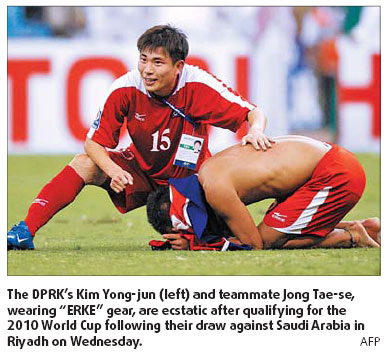The "mysterious men from the north" are back in the soccer World Cup finals after 44 years - and at least some proud Chinese are cheering for them.

Wearing bright red jerseys, colored shoes and socks, and sporting a white-swan mascot above the Chinese brand name "ERKE" on their chests, the sun-tanned men from the Democratic People's Republic of Korean (DPRK) left the Saudi Arabian capital Riyadh on a high after a goalless draw on Wednesday. The stalemate was enough to secure a spot in the 32-nation field next year, joining host South Africa, the Netherlands, Australia, Japan and its neighbor the Republic of Korea. China failed to qualify in the preliminary Asian round.
"It was very difficult to enter the 2010 finals. The DPRK soccer team owes its success to the Chinese company," said Hong Myong-chol, deputy sports attach at the DPRK embassy in China.
The team, which became the first team dressed up for the top international sports event in Chinese gear, will fly into Beijing today before joining celebrations back in their country, the official said.
Wei Hongtao, marketing chief of Fujian-based Hongxing ERKE, said: "We chose the team because they play with real guts."
Wei said he has maintained a close relationship with the reclusive nation and the company has sponsored all the country's teams and athletes since 2006, including the Beijing Olympics last year.
He would not reveal the value of the deal with the DPRK but said it is "higher than the sponsorship paid for national teams in countries with the same level of per capita income".
Iraq is the only known international soccer team sponsored by a Chinese company - PEAK, also based in Fujian.
The Iraqis have been knocked out of the World Cup finals but are the reigning Asian champions. While PEAK also sponsors the Argentine basketball team, big brands like Anta and Li Ning have recently signed on tennis star Jelena Jankovic and Russian double Olympic champion Elena Isinbayeva despite the downturn in the global sports market.
The DPRK team, described by the British media as the "mysterious team from the north" made a splash during their last World Cup appearance in 1966 in England.
Residents of Middlesbrough still remember the wining goal by Corporal Pak Doo-Ik in the 40th minute against the Italians in the now-demolished Ayresome Park stadium, which took the DPRK to the last eight, where they stumbled.
More than four decades later, the nation's international standing has been diminished: The recent nuclear and missile tests have brought condemnation and sanctions from the UN Security Council.
Asked whether the tense situation might dent the company's brand, Wei was categorical: No. "We sponsored them because we have faith in the nation's sporting spirit. Our move should not be tied up with politics."
Deng Haixia, the company's liaison officer with DPRK for two years, said the athletes appear to be "polite" and "conservative", while the government seemed to be "pretty strict" about checking the communications between the company and sports officials.
"The process is rather slow, but the work gets done in the end," said Deng, who has watched the DPRK soccer team play in China.
The officials do not make excessive demands on the company, which decides on the quantity of playing kit depending upon the need, she said.
DPRK athletes are generally frugal, said Wei, adding that the players seemed to be keen on the color red, which they believe will bring the team good luck.
(China Daily June 19, 2009)